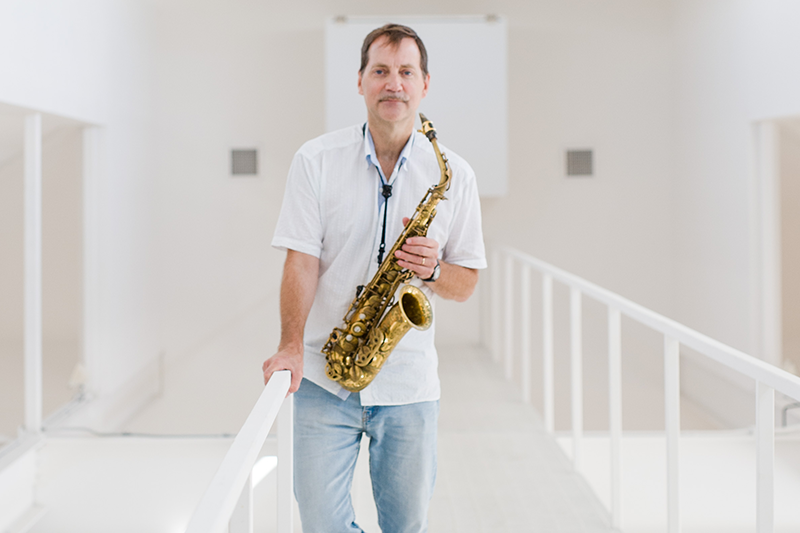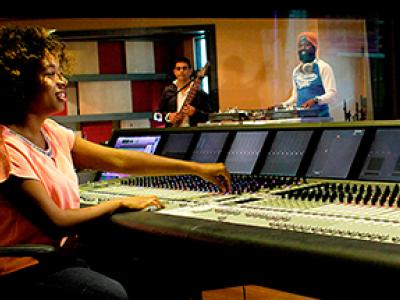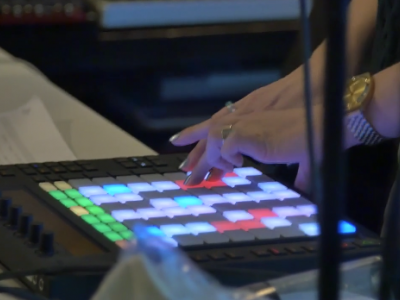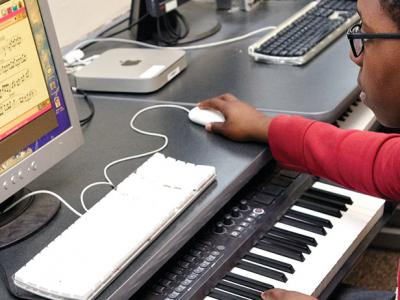As an electronic production and design major, you’ll learn how to use technology to create and produce compositions, sonic design, and instruments. Over eight semesters, while completing the college’s core music curriculum, you’ll gather deep, adaptable knowledge of technologies used to create and manipulate sonic elements. Through working with a diverse community of musicians, faculty, and industry professionals, and using our state-of-the-art technology and recording facilities, you’ll gain real-world experience while earning a bachelor's degree.
Learn more about the courses and curriculum.
WATCH
Sound Curiosity
Learn how the Electronic Production and Design Department (EPD) puts a premium on sonic experimentation, helping you create new musical ideas for everything from EDM and DJing to production and classical music.
Alumni Story
Zak Leever B.M. '16
EPD alumnus Zak Leever teamed up with guitar performance major Alex Waldin for a project that is making waves in New York City's EDM scene.
Meet Your Mentors
Neil Leonard, Professor
As artistic director of the Berklee Interdisciplinary Arts Institute (BIAI) and a professor in the EPD department, Neil Leonard guides students in collaborating with artists working in every medium imaginable.
Visiting Artists
Laurie Anderson Joins EPD as a Virtual Visiting Artist
Anderson will serve as the 2021 virtual visiting artist for the EPD Department, primarily to help students continue to develop the Dream Machine, a virtual performance experience set inside a custom-built video game.
-
Study Abroad
Study abroad at our Valencia, Spain, campus. It is recommended that EPD majors study in Valencia during their third, fourth, fifth, or sixth semester. For specific program information, please see the chair or contact the study abroad office.
Program Details
Full Description
Students majoring in electronic production and design master the musical and creative use of electronic music production and sound design tools and technologies. Working in professional-level, 5.1-equipped studios, classrooms and labs, and performance spaces, students study electronic music composition and production, synthesizer programming, sound design techniques for all types of visual media, interactive performance systems, digital signal processing, alternate controllers, game audio design and implementation, software design, audio art and installation design, and more.
Through classroom emphasis on musicianship, creativity, knowledge of concepts, and technical expertise as well as close interaction with faculty and visiting artists, students develop a unique aesthetic vision. Instruction emphasizes deep knowledge of technologies used in electronic music and sound design, and styles of musical expression in an effort to develop an individual creative identity. The electronic production and design curriculum also provides a solid foundation for continued learning and effective performance in a profession that is constantly changing and evolving.
What Will I Learn?
Upon completion of a major in electronic production and design, students will:
- compose and produce original electronic music compositions;
- apply a comprehensive understanding of audio signal flow and recording mixing techniques to a variety of professional production projects;
- design original synthesizer sounds using a variety of sound synthesis techniques including subtractive, additive, FM, sampling, granular, and others;
- produce original sound design elements for film, video projects and video game projects;
- perform live electronic music using a variety of hardware devices and software;
- design, build, and use hardware and software electronic instruments;
- design and configure a comprehensive personal production system;
- design and configure systems for multimedia and audio art installations; and
- code audio software applications.
Entrance Requirements
Electronic production and design is a capped major with a separate application process. Each student completes an application form, submits an essay and original music, and interviews with the chair or a full-time faculty member. The chair and full-time faculty have a selections meeting following the conclusion of all interviews. Learn more about the process to apply to the major.
*Students are strongly encouraged to register for LMSC-208 Music Acoustics or LMSC-209 Architectural Acoustics and LMSC-261 Introduction to Computer Programming as early as possible in the major
Curriculum and Courses
There are 33 required credits specific to this major in addition to the B.M. required core music courses (41 credits), liberal arts courses (36 unique credits, and 3 credits that double count towards the major), and general electives (10 credits) for a degree total of 120 credits. See the sample curriculum here.
- EP-220 Studio Technologies (2 credits)
- EP-223 Modular Functions and Signal Flow (2 credits)
- EP-225 Control Systems in Electronic Production (2 credits)
- EP-320 Digital Mix Techniques (2 credits)
- EP-321 Control Systems in Advanced Production (2 credits)
- EP-322 Advanced Sound Design Techniques (2 credits)
- EP-341 Programming in Max (2 credits)
- EP-381 Digital Audio Production and Design (2 credits)
- EP-401 Advanced Seminar (2 credits)
- EP-491 Advanced Projects in Electronic Production and Design (2 credits)
- LMSC-208 Music Acoustics or LMSC-209 Architectural Acoustics (3 credits)
- LMSC-261 Introduction to Computer Programming (3 credits)
- Major electives (10 credits)
Sample Curriculum by Semester






